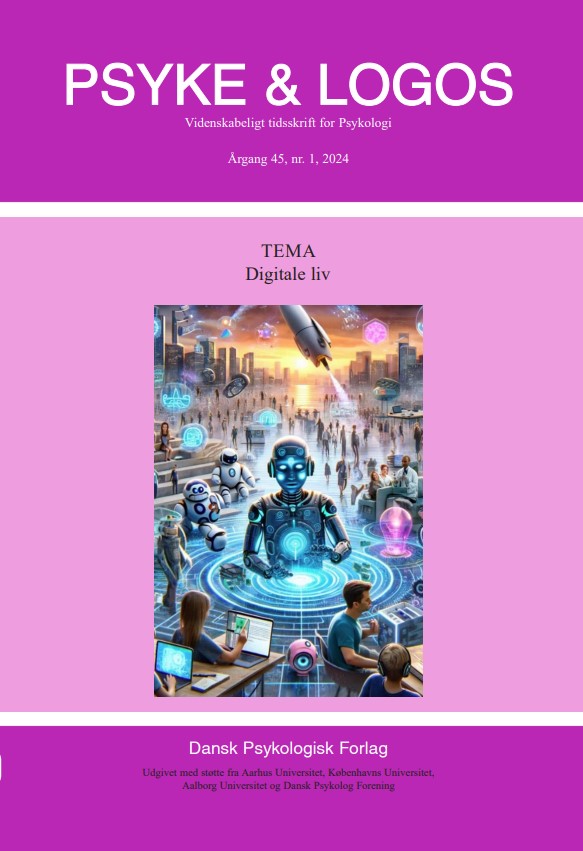Digital Lives - An introduction
DOI:
https://doi.org/10.7146/pl.v45i1.146542Keywords:
digital, psychology, technology, materialityAbstract
In this issue of Psyche and Logos, we delve into our digital lives. Today, we live in a world where we are permanently online, permanently connected. While technology has always been a part of human existence, digitisation has fundamentally altered our psychological conditions. What is modern identity formation without social media? Love without dating apps? Or upbringing without screen time? Therefore, contemporary psychology must address our digital lives, and this introduction aims to outline some important aspects of this phenomenon. First, we argue that psychotherapy has always been technologically mediated, which means that digital technologies cannot be dismissed based on an idealised notion of the “pure” human encounter but must instead be explored – and critiqued – empirically. Then, we invite critical reflection on the societal role of psychology, as its primary goal of understanding, predicting, and shaping human behaviour has been overtaken by contemporary surveillance capitalism. The final area we touch upon is the importance of not being blinded by concepts like “the cloud”, as this airy language conceals the material consequences of our digital lives. Finally, we present the articles in this issue and their insights into our digital existence.
References
Aagaard, J. (2015). Drawn to distraction: A qualitative study of off-task use of educational technology. Computers & Education, 87, 90-97. https://doi.org/10.1016/j.compedu.2015.03.010
Canguilhem, G. (1980). What is Psychology? Ideology & Consciousness, 7, 37-50.
Crawford, K. (2021). Atlas of AI: Power, Politics, and the Planetary Costs of Artificial Intelligence. Yale University Press. https://doi.org/10.12987/9780300252392
Freud, S. (1913). On Beginning the Treatment (Further Recommendations on the Technique of Psycho-analysis). Hogarth Press.
Hasse, C. & Brok, L. (2015). TEKU-modellen: Teknologiforståelse i professionerne. U Press.
Holt, N.J., Bremner, A., Vliek, M., Sutherland, E., Passer, M. & Smith, R.E. (2024). Psychology: The science of mind and behaviour (5. udgave). McGraw-Hill.
Jarlner, M. (2024). Når det handler om kunstig intelligens har Marie Bjerre en plan… Politiken, 17. januar 2024. https://politiken.dk/viden/Tech/art9660897/N%C3%A5rdet-handler-om-kunstig-intelligens-vil-Marie-Bjerre-skrue-op-for-optimismen-ogned-
for-bekymringerne
Jung, C.G. (1935/1976). The Tavistock Lectures. Collected Works, vol. 18. Princeton University Press.
Kreshel, P.J. (1990). John B. Watson at J. Walter Thompson: The Legitimation of ‘Science’ in Advertising. Journal of Advertising, 19(2), 49-59. https://doi.org/10.1080/00913367.1990.10673187
Latour, B. (1993). We Have Never Been Modern. Harvard University Press.
Lingiardi, V. & De Bei, F. (2011). Questioning the Couch: Historical and Clinical Perspectives. Psychoanalytic Psychology, 28(3), 389-404. https://doi.org/10.1037/a0024357
Luccioni, A.S., Jernite, Y. & Strubell, E. (2023). Power Hungry Processing: “Watts” Driving the Cost of AI Deployment?https://doi.org/10.48550/arXiv.2311.16863.
Obringer, R., Rachunok, B., Maia-Silva, D., Arbabzadeh, M., Nateghi, R. & Madani, K. (2021). The Overlooked Environmental Footprint of Increasing Internet Use. Resources, Conservation and Recycling, 167, artikel 105389. https://doi.org/10.1016/j.resconrec.2020.105389
Rasmussen, O.V., Alving, P., Frydenlund, J.H. & Bærentsen, K.B. (2020). Globale kriser: Psykologien i en ny tidsalder? Psyke & Logos, 41(2), 5-16. https://doi.org/10.7146/pl.v41i2.127493
Rose, N. (2004). Power and Psychological Techniques. I R. House & Y. Bates (red.),
Ethically Challenged Professions. PCCS Books.
Seidenfaden, D. (2022). Psykologiens nye veje. Psykologernes Fagmagasin P, 11.november 2022. https://www.dp.dk/p-psykologernes-fagmagasin/artikler/dea-seidenfaden-den-teknologiske-udvikling-paavirker-vores-muligheder-for-at-behandleklienter/
Selwyn, N. (2024). On the Limits of Artificial Intelligence in Education. Nordisk tidsskrift for pedagogikk og kritikk, 10, 3-14. https://doi.org/10.23865/ntpk.v10.6062
Zuboff, S. (2019). The age of surveillance capitalism: The fight for a human future at the new frontier of power. Profile Books.
Downloads
Published
How to Cite
Issue
Section
License
Ophavsret er tidsskriftets og forfatternes. Det er gældende praksis, at artikler publiceret i Psyke & Logos, som efterfølgende oversættes til andet sprog, af forfatteren frit kan publiceres i internationale tidsskrifter, dog således at det ved reference fremgår, at den oversatte artikel har et forlæg i en dansksproget version i Psyke & Logos. Artikler kan frit deles og linkes til på forsknings- og undervisningsnetværk (så som Blackboard). Link foretrækkes, fordi det giver oplysning om brug af tidsskriftets artikler.




